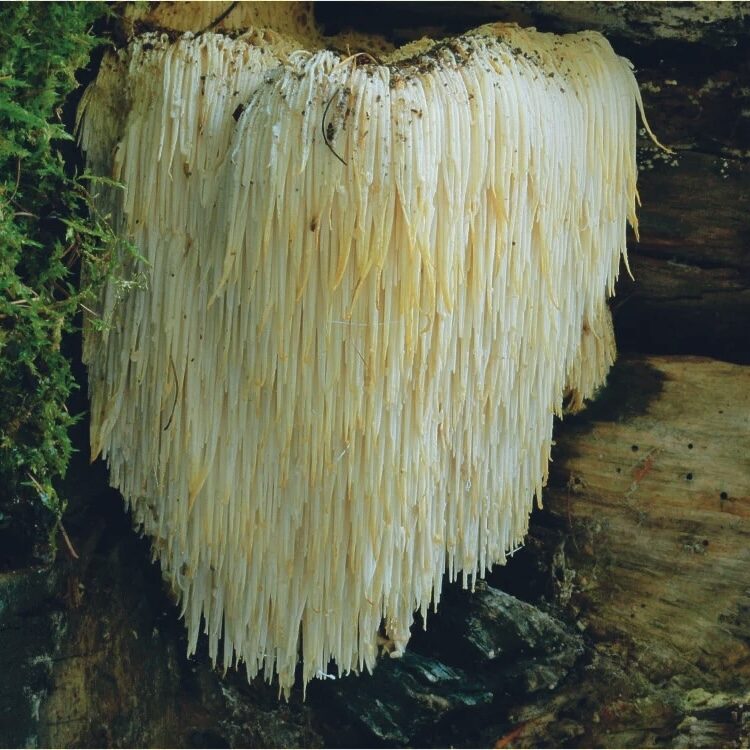
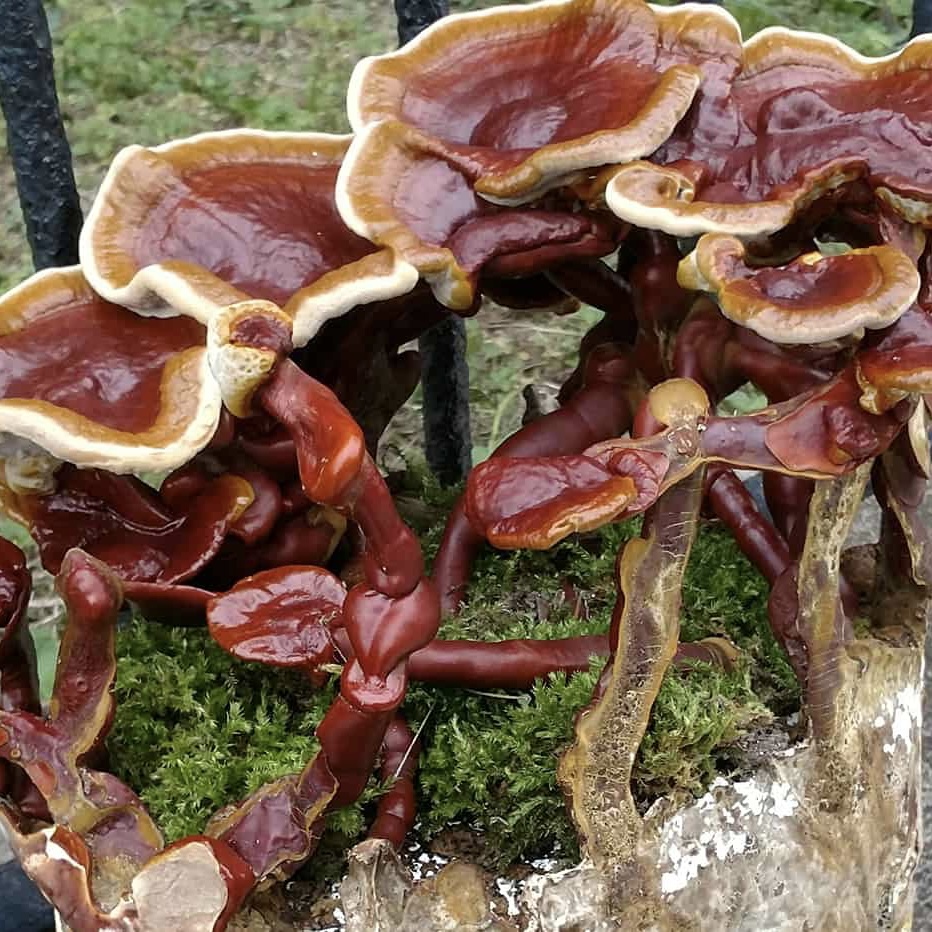
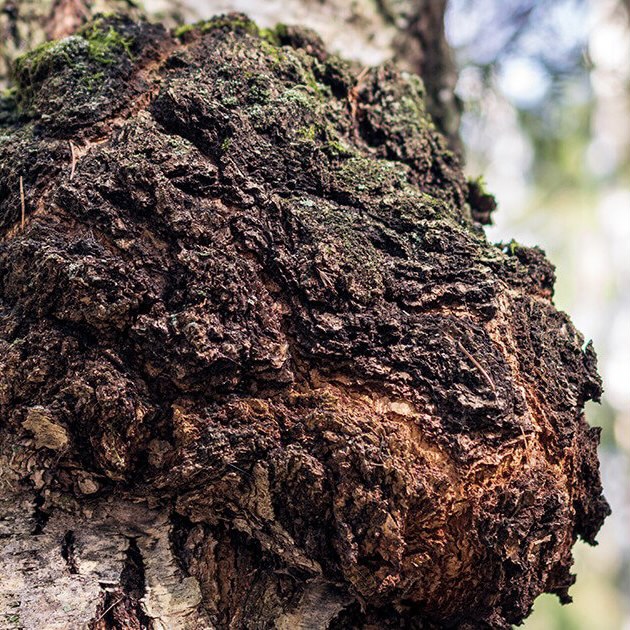
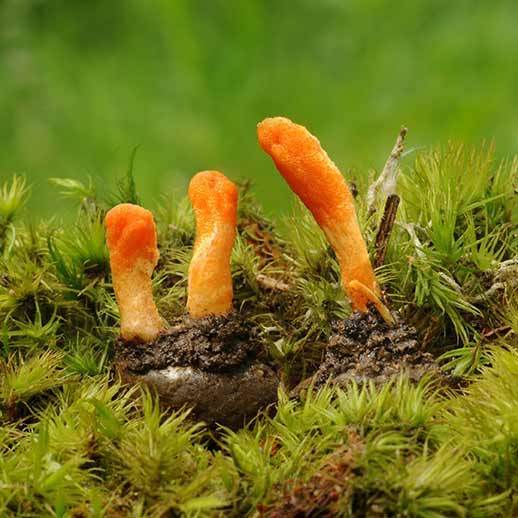
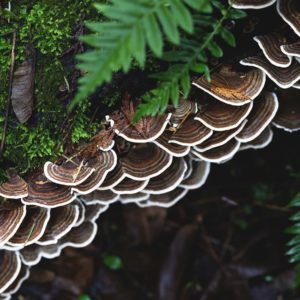
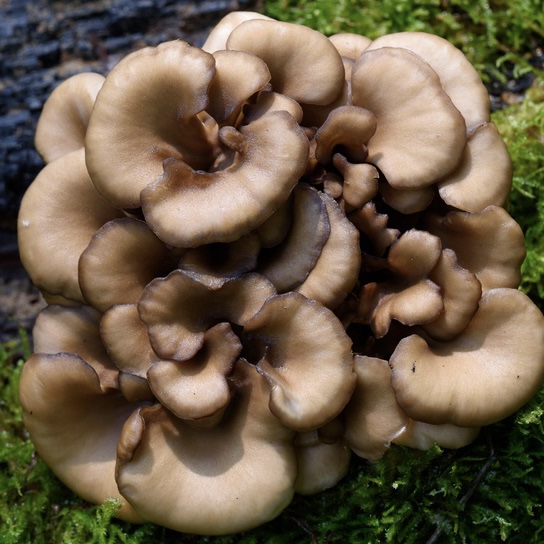
These magical medicinal mushrooms have been used for centuries in traditional medicine and are increasingly becoming popular as a daily natural support supplement. Personally my medicinal herbalist introduced Reishi to me over 10 years ago and I have consistently taken this as a supplement as an overall general tonic for my well-being. Recently I have noted that he has made an additional “mushroom medicine” capsule containing the four most nourishing mushrooms: Chaga, Cordyceps, Coriolus (Turkey tail) and Reishi.
All of the mushrooms I have listed below are exceptionally good for your health and wellbeing - taken on a daily basis can strengthen your immune + nervous system.
There is also a first of its kind clinical trial launched in San Diego to see if certain mushrooms can help treat disease in its early stages, the principal investigator hoping that mushrooms might have the ability to reduce the severity of Covid. The principal mushrooms he is interested in being Turkey Tail and Agarikon Read more on that HERE
The more research I do the more information I will add to this page so please refer back to this page from time to time to see if there are any new developments with research that I have found on medicinal mushrooms.
LIONS MANE (Hericium erinaceus)
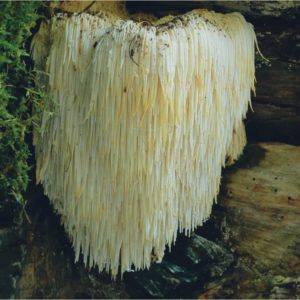
Lion’s mane mushrooms have a fruiting body that consists of white, stringy spines. In China they refer to this as Hou Tou Gu (Monkey Head Mushroom) and the Japanese call it the Yambushitake.
The effects of Lions Mane (Hericium) according to traditional Chinese medicine:
- strengthens the stomach and regulates its Qi
- replenishes the spleen and promotes digestion
- calms the spirit Shen and strengthens brain activity
- affects all organ systems
Buddhist monks were said to have used Lion’s Mane mushroom powder as a tea to enhance brain power and heighten their focus during meditation.
Lion’s Mane provides nourishment for the brain, crossing the blood-brain barrier to directly support brain cells, having a unique influence on the peripheral and central nervous system. It also contains beta glucan polysaccharides which supports immune health.
A 2012 study evaluating the medicinal potential of 14 types of mushroom found that lion’s mane had the fourth highest antioxidant activity, which researchers described as “moderate to high.”
REISHI MUSHROOM (Ganoderma lucidum) - the mushroom of spiritual awakening
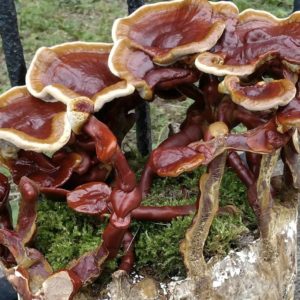
The common names for Reishi translate to things like ‘Auspicious mushroom’, ‘Immortal Wizard’, ‘Divine mushroom’, “Sacred mushroom” representing a combination of spiritual potency and essence of immortality - symbolizing success, well-being, divine power and longevity. The reishi mushroom was first discovered by Chinese healers more than 2,000 years ago in the Changbai Mountains. The reishi mushroom is known as” the king of all herbal medicines”. Professor Hirosoki Hikino, University of Tohoku, Japan is “one of the most important elixors in the Orient”.
Reishi is said to initiate benevolent cycles of health of the person who drinks the tea. It is not mind altering, but does have beneficial effects on consciousness, bringing clarity and activating connection with one’s higher destiny and potential. Reishi can show us the way to our abundance. When we have reishi in our lives, along with pure foods, healthy lifestyle, a clean inner body and a spiritual discipline, enlightenment can be accelerated.
It could be a great blessing when reishi comes into your life, a sign that you are opening to abundance in your life, and that you may be able to help others. Reishi mushroom is truly a cosmic messenger to help us manifest higher energy, protect us from the lower frequencies of discord, and rapidly relieve karma of past negative acts. READ MORE….
Scientists at Chines University of Hong Kong isolated substances in reishi that belong to the triterpene group, ganoderma acids A, B, C, D, glucidenic acid B, and gamodermatrol, all very powerful anti-oxidants.
CHAGA Inonotus Obliquus
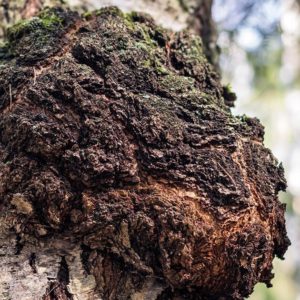
Chaga mushroom grows on birch trees in the northern hemisphere. It looks more like a dark clump of dirt than a mushroom. It has traditionally been used in folk medicine for various ailments across Northern Europe.
This lovely clump of black goodness contains a wide variety of vitamins, minerals, nutrients and antioxidants. Chaga supports the immune system and fight inflammation within the body.
An increasing number of academic research backs up the use of Chaga for health reasons. The University California’s immunology department, a chaga extract was noted to positively improve immunity by reducing inflammation band fighting harmful bacteria and viruses. Also, studies conducted at the Shenyang University in China found that chaga works by assisting the proteins (called cytokines), which are responsible for regulating the immune system.
There is also some very interesting studies being done with Chaga demonstrating its ability to suppress the growth of tumors. So this little black conk is quite extraordinary!
CORDYCEPS MILITARIS
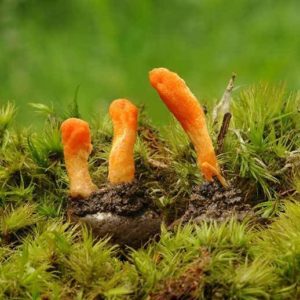
Cordyceps is naturally found at high altitude in the mountains of China, Nepal and Tibet. It is also known as the Caterpillar fungus, growing as a parasite on insects. When this fungi attacks its host, they replace its tissue and sprout long slender stems that grow outside the hosts body.
This fungi has been hand collected and used in traditional Chinese and Tibetan medicine, highly valued as a natural vitality elixir to help combat illness, improve stamina and increase longevity.
It may also improve immunity by stimulating cells and specific chemicals in the immune system. Cordyceps is also recognized for its ability to improve the availability of oxygen in the blood: improving vitality, indurance and stamina.
Find out more about Cordyceps here
TURKEY TAIL Corilous versicolour or Polyporus versicolour

Turkey Tail is a common mushroom found throughout the world and its name “versicolour” describes the various colours similar to those of a wild turkey. It commonly grows in layers on logs and stumps of deciduous trees in North America.
The most impressive quality of turkey tail mushroom is its ability to enhance the health of your immune system. It is packed with antioxidants (in one study showing 35 different phenolic compounds including the powerful antioxidants quercetin and baicalein), and contains immune boosting polysaccharopeptides. It may also enhance gut health as it contain probiotics and may enhance outcomes for certain cancer treatments.
Turkey tail is most well known for containing polysaccharide-K (PSK), which is an approved anticancer prescription drug in Japan. PSK also helps to stimulate your immune system. This wonderful mushroom and has incredible potential.
MAITAKE Grifola Frondosa (Hen-of-the-woods)
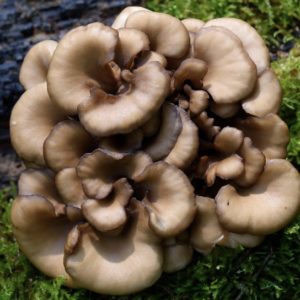
Maitake means “dancing mushroom” and is a soft-fleshed polypore mushroom that grows at the base of trees (particularly oaks), and is native to Europe, China, and North America.
Maitake mushroom is rich in bioactive polysaccharides, especially D-fraction, MD-fraction, and SX-fraction. These protein polysaccharides have well-documented immune-protecting and antitumor properties.
In addition, maitake may provide health benefits such as:
- Improve your immune response.
- Improve artery functionality
- Help lower LDL (bad) cholesterol levels
- Better overall cardiovascular health, and therefore lower your risk for heart disease.
- May lower your blood sugar levels, support the immune system and help in targeting and destroying cancerous cells
NOTE: The information provided here is for informational purposes only, so do not consider it as health care or medical diagnosis and treatment. Do not consider this information as a guarantee of the results you want to achieve. In addition, do not take this information as a replacement for the advice of your physician or other healthcare professional.
Even more, you should not use it to diagnose or treat a health problem. Before changing or discontinuing your existing medication, treatment, or care, or taking any dietary supplements, be sure to consult with your healthcare professional or doctor before starting any diet or program, or if you suspect you may have a medical condition.
REFERENCES LIONS MANE:
- Myco Medica “Hericium” https://www.mycomedica.eu/hericium.html
- https://www.nutritionaloutlook.com/view/ingredient-spotlight-lions-mane-mushroom
- Mayumi Nagano et al. “Reduction of Depression and Anxiety by 4 Weeks Hericium erinaceus Intake,” Biomedical Research 31, no. 4 (2010): 231-7, https://pubmed.ncbi.nlm.nih.gov/20834180.
- I-Chen Li et al. “Neurohealth Properties of Hericium erinaceus Mycelia Enriched with Erinacines,” Behavioural Neurology, May 21, 2018, https://www.ncbi.nlm.nih.gov/pmc/articles/PMC5987239.
- Koichiro Mori et al., “Improving Effects of the Mushroom Yamabushitake (Hericium erinaceus) on Mild Cognitive Impairment: A Double‐Blind Placebo‐Controlled Clinical Trial,” Phytotherapy Research 23, 3 (2008): 367-372, https://onlinelibrary.wiley.com/doi/abs/10.1002/ptr.2634.
- I-Chen Li et al., “Prevention of Early Alzheimer’s Disease by Erinacine A-Enriched Hericium erinaceus Mycelia Pilot Double-Blind Placebo-Controlled Study,” Frontiers in Aging Neuroscience (2020), https://www.frontiersin.org/articles/10.3389/fnagi.2020.00155/full.
- Xiaotong Sheng et al. “Immunomodulatory Effects of Hericium erinaceus Derived Polysaccharides are Mediated by Intestinal Immunology,” Food & function 8, no. 3 (2017): 1020-1027, https://pubmed.ncbi.nlm.nih.gov/28266682.
- M Nagano et al., “Reduction of depression and anxiety by 4 weeks Hericium erinaceus intake," Biomedical Research, vol. 31, no. 4 (August 2010): 231–237.
- K Mori et al., “Improving effects of the mushroom Yamabushitake (Hericium erinaceus) on mild cognitive impairment: a double-blind placebo-controlled clinical trial,” Phytotherapy Research, vol. 23, no. 3 (March 2009): 367–372.
REFERENCES REISHI:
- Find out more about Reishi here
- https://awakeandempoweredexpo.com/magazine/reishi-mushroom-spiritual-immortality-0
- https://www.ncbi.nlm.nih.gov/books/NBK92757/
- https://drdebrahoffman.com/nutrition/reishi-mushrooms-king-of-herbal-medicine
- https://awakeandempoweredexpo.com/magazine/reishi-mushroom-spiritual-immortality-0
- ECOSH “RED REISHI MUSHROOM (GANODERMA LUCIDUM, LINGZHI) – 13 Surprising Health Benefits of Reishi Mushroom Based on Science” https://ecosh.com/red-reishi-mushroom-ganoderma-lucidum-lingzhi-13-surprising-health-benefits-of-reishi-mushroom-based-on-science/
REFERENCES CORDYCEPS:
- Scientific American “The Scientific Evidence for the Health Benefits of Cordyceps” https://www.scientificamerican.com/article/the-scientific-evidence-for-the-health-benefits-of-cordyceps/
- NCBI: “Cordycepin for Health and Wellbeing: A Potent Bioactive Metabolite of an Entomopathogenic Medicinal Fungus Cordyceps with Its Nutraceutical and Therapeutic Potential” https://www.ncbi.nlm.nih.gov/pmc/articles/PMC7356751/
- ECOSH “CORDYCEPS – 14 Health Benefits Backed by Science” https://ecosh.com/cordyceps-14-health-benefits-backed-by-science/
REFERENCES CHAGA:
- Memorial Sloan Kettering Cancer Centre “Chaga Mushroom” https://www.mskcc.org/cancer-care/integrative-medicine/herbs/chaga-mushroom
- UPMPULP “Chaga the next superfood” https://www.upmpulp.com/media/blogs-and-stories/stories/chaga--the-next-superfood-could-be-from-finlands-forests/
- NCBI “Chaga a future potential Medicinal Fungus in Oncology” https://www.ncbi.nlm.nih.gov/pmc/articles/PMC6142110/
- NCBI “Continuous intake of Chaga Mushroom” https://www.ncbi.nlm.nih.gov/pmc/articles/PMC4946216/
- US National Library of Medicine “Mushroom Based Product for Covid-19” https://clinicaltrials.gov/ct2/show/NCT04667247?term=mushroom&draw=3
- San Diego News “Can mushrooms fight Covid” https://www.10news.com/news/coronavirus/can-mushrooms-fight-covid-uc-san-diego-launches-first-of-its-kind-clinical-trial?_amp=true
- ECOSH “CHAGA MUSHROOM (INONOTUS OBLIQUUS) – 9 Incredible Evidence-Based Potential Health Benefits of Chaga That May Extend Your Life”https://ecosh.com/chaga-mushroom-inonotus-obliquus-9-incredible-evidence-based-potential-health-benefits-of-chaga-that-may-extend-your-life/
REFERENCES TURKEY TAIL:
- https://www.healthline.com/nutrition/turkey-tail-mushroom
- https://www.flowstate.nz/blogs/news/two-new-favourites-turkey-tail-and-maitake
- NCBI “Trametes versicolor (Turkey Tail Mushrooms) and the Treatment of Breast Cancer” https://www.ncbi.nlm.nih.gov/pmc/articles/PMC4890100/
- Bastardized University “FDA Approves Turkey Tail for Trial in Cancer Patients” https://bastyr.edu/news/general-news/2012/11/fda-approves-bastyr-turkey-tail-trial-cancer-patients
- National Cancer Institute “Medicinal Mushrooms” https://www.cancer.gov/about-cancer/treatment/cam/hp/mushrooms-pdq
- Memorial Sloan Kettering “Coriolus versicolour” https://www.mskcc.org/cancer-care/integrative-medicine/herbs/coriolus-versicolor
- NCBI “Coriolus Versicolour and Ganoderma Lucidum related natural products as an adjunct therapy for cancers” https://www.mskcc.org/cancer-care/integrative-medicine/herbs/coriolus-versicolor
REFERENCES MAITAKE:
- WEBMED: “Maitake Mushroom: Health Benefits, Nutrition, and Uses” https://www.webmd.com/diet/maitake-mushroom-health-benefits#1
-
NCBI: “Bioactive Ingredients and Medicinal Values of Grifola frondosa (Maitake)” https://www.ncbi.nlm.nih.gov/pmc/articles/PMC7824844/
